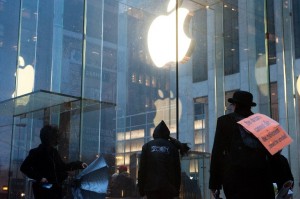WASHINGTON, United States (AFP) — Apple is battling the US government over unlocking devices in at least 10 cases in addition to its high-profile dispute involving the iPhone of one of the San Bernardino attackers, court documents show.
The existence of other court fights supports Apple’s argument that the legal case in California is about more than a single iPhone.

Apple provided a list of cases where it is opposing the US Justice Department’s requests in a February 17 letter to a federal judge in Brooklyn, where the company is challenging government efforts to access an iPhone in a drug trafficking case.
The letter said the requests sought Apple’s assistance under the All Writs Act, a 1789 law which allows the courts broad authority to help law enforcement.
“Apple has not agreed to perform any services on the devices to which those requests are directed,” Apple’s lawyer Marc Zwillinger said in the letter.
The letter said the cases were “similar in nature” but did not provide specifics about the government’s requests.
It said the San Bernardino case was “even more burdensome” than the other requests because it would require the company to create new software to help investigators break into the iPhone.
Apple has been locked in a legal and public relations battle with the government in the California case, where the FBI is seeking technical assistance in hacking the iPhone of Syed Farook, a US citizen, who with his Pakistani wife Tashfeen Malik in December gunned down 14 people.
– ‘Inconsistent’ stand –
In the Brooklyn case, prosecutors responded to the Apple letter with their own filing, claiming that the company’s position has been “inconsistent at best.”
“Apple did not file objections to any of the orders, seek an opportunity to be heard from the court, or otherwise seek judicial relief,” the letter said.
“In most of the cases, rather than challenge the orders in court, Apple simply deferred complying with them, without seeking appropriate judicial relief.”
The letter from US Attorney Robert Capers said that “numerous judges around the nation have found it appropriate, under the All Writs Act, to require Apple to assist in accessing a passcode-locked Apple device where law enforcement agents have obtained a warrant to search that device.”
Apple’s letter to the Brooklyn judge cited nine additional cases in New York, California, Illinois and Massachusetts where the government was seeking assistance in accessing iPhones or iPads.
The Wall Street Journal, which reported the existence of the cases earlier Tuesday, said those apart from the one in San Bernardino were not terrorism-related.
Apple said Monday it supports the idea of a panel of experts to consider access to encrypted devices if US authorities drop their legal battle.
“Apple would gladly participate in such an effort,” the company said.
The Apple response came after FBI Director James Comey explained the government’s position, saying it was about “the victims and justice” in the San Bernardino attack, whose perpetrators are believed to have been inspired by the Islamic State group.
“We don’t want to break anyone’s encryption or set a master key loose on the land,” Comey said in a posting that appeared on the Lawfare blog and on the FBI website.
“The San Bernardino litigation isn’t about trying to set a precedent or send any kind of message,” Comey said. “It is about the victims and justice.”
A poll by the Pew Research Center survey found 51 percent of respondents supported the effort to require Apple to help unlock the iPhone, while 38 percent said Apple should not unlock the phone to ensure the security of its other users. Eleven percent did not offer an opinion.
© 1994-2016 Agence France-Presse







